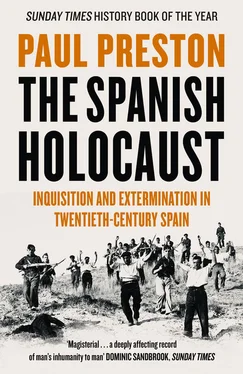In most southern provinces, the Casas del Pueblo were still closed sixteen months after the October revolution. In Granada, for example, the Republican newspapers mysteriously disappeared en route from Granada to outlying towns and villages, while the CEDA paper Ideal always got through. Ideal called on right-wingers to abandon their ‘suicidal inertia’, recommending a few beatings to keep the left quiet. In many provinces, caciques hired thugs who, often with the assistance of the Civil Guard, prevented the dissemination of left-wing propaganda. Republican posters were ripped down at gunpoint; Republican orators were turned away from villages by roadblocks or simply arrested. Rumours were spread that the peasants could not vote unless they had special documentation. 30
The atmosphere was captured with all its bitterness by Baldomero Díaz de Entresotos who was the land registrar in Puebla de Alcocer in the area in north-east Badajoz known as La Siberia Extremeña. Highly sympathetic to fascism, Díaz de Entresotos was affronted by the fact that a taxi firm in Castuera used second-hand cars to carry the local working class at reasonable prices. A landowner commented to him:
what we don’t need are elections and tolerance. It’s all well and good that we used to have such things when it was all kept between ourselves, just to decide whether liberals or conservatives or so-and-so or so-and-so would be in charge. But now, when it’s about law and order or revolution, we don’t need all this drivel about parliament and democracy. The answer here is to force this rabble to submit, by whatever means, if necessary cutting off their heads before they cut off ours.
One of Díaz de Entresotos’s close friends was a landowner, Alfonso Muñoz Lozano de Sosa, who was also an infantry lieutenant serving with the Assault Guards. On election day, 16 February, he came to Puebla de Alcocer with a machine-pistol. The village was also visited on that day by Ricardo Zabalza, the secretary general of the landworkers’ union, the FNTT, who was a Socialist candidate for Badajoz. Zabalza was eating alone at the local inn, with his head down, deeply aware of the hostility of his fellow middle-class customers. Díaz de Entresotos had lunch with Lieutenant Muñoz and wrote later of his visceral hatred of Zabalza (on the basis of this one sighting and without ever actually meeting him). Zabalza, a schoolmaster, was invariably neatly and cleanly dressed. However, such was Díaz de Entresotos’s paranoid loathing of the left that he saw only an abomination:
Zabalza looked just like what he was. Unkempt and repulsive, as befitted his damaging activities. He went around the villages advising riot and plunder. It was rumoured that, during the peasants’ strike of 1934, he had put a bomb on a railway line. I had no idea if this fact [sic] was true but, looking at this grim and dirty man, it seemed perfectly likely. How many times that day did I gaze on Muñoz’s machine-pistol, dwelling on the pleasure it would give me to open fire on that disgusting flesh!
When the election results began to come in, Muñoz commented ominously, ‘This has to be settled with bullets.’ 31Their desire to see Zabalza dead would be satisfied four years later when he was executed by firing squad in a Francoist prison. 32
The narrowness of the left-wing electoral victory reflected the polarization of Spanish society. The working masses, especially in the countryside, were in no mood for compromise after the so-called ‘two black years’ of vindictive right-wing government from 1933 to 1935. Both the rural and urban working classes demanded reparation for the post-October repression and the swift implementation of the reform programme elaborated by the leaders of the Popular Front electoral coalition. Considerable alarm ran through the middle classes when crowds gathered at prisons in Asturias and elsewhere calling for the release of those imprisoned after October 1934 and when groups of labourers presented themselves for work at the large estates. In many rural towns, there were attacks on the casinos (landowners’ clubs). In others, churches were burned in reprisal for their priests having justified the repression and using their pulpits for right-wing propaganda during the electoral campaign.
The new Prime Minister Manuel Azaña was horrified by the violence of popular agitation and rapidly embarked on a programme of conciliation. On 20 February 1936, his first cabinet meeting approved the return of the elected town councils and decreed an amnesty for those imprisoned after October 1934. The following day, Azaña made a radio broadcast to the nation in which he undertook to ‘heal the wounds caused in recent times’ and promised that his government would not seek revenge for the injustices of the last two years. He was confident that the popular ferment was a temporary phenomenon, fruit of the euphoria that accompanied the electoral victory. With a view to calming the agitation, on 29 February his cabinet issued a decree obliging employers to readmit workers sacked because of their ideology or for participating in strikes after 1 January 1934 and to compensate them with their pay for a minimum of thirty-nine days or a maximum of six months. The immediate reaction of a huge group of employers’ organizations was to issue a statement that this constituted a ‘true economic catastrophe’. In the short term, it appeared that the right in general expected from Azaña, as the dramatist Ramón del Valle Inclán put it, ‘what the sick expect from cod-liver oil’. 33
However, Azaña faced debilitating problems. Despite his broadcast, the rural agitation continued. He was deeply depressed by news of events in Yecla in the north of Murcia, where seven churches, six houses and the property registry had been set alight. 34His ability to control the situation was severely undermined by the refusal of Francisco Largo Caballero to permit Socialist participation in the cabinet. Distrustful of Republican moderation, he had been prepared to support the electoral coalition only to secure political amnesty for the victims of the repression. Embittered by right-wing obstruction of reform between 1931 and 1933, Largo Caballero believed that only an exclusively Socialist cabinet could transform Spanish society. His overconfident view was that the Left Republicans should pursue their own programme and effectively exhaust themselves in carrying out the bourgeois stage of the revolution. They would then either make way for a Socialist cabinet or be engulfed by a fascist uprising which would itself trigger a successful revolution.
On 3 April 1936, Largo Caballero was interviewed by the American journalist Louis Fischer and he told him complacently: ‘The reactionaries can come back into office only through a coup d’état.’ 35He was just mouthing revolutionary platitudes, but unfortunately the counterfeit nature of his revolutionary rhetoric was not perceived as such among the middle and upper classes. While their fears of revolution were intensified by right-wing propaganda, Largo Caballero’s policy prevented both revolution and strong government. It eventually ensured instead that an ineffectual Republican government would be in power while the military conspiracy was prepared.
The tension was such that Azaña felt obliged to calm things down. He wrote to his brother-in-law: ‘every night the left feared a military coup aimed at preventing communism. The right feared that the Soviet was on the horizon. I’ve never seen such panic or such a stupid situation. The Socialists have organized an intelligence system based on concierges, cleaners and chauffeurs, and they get all the below-stairs gossip.’ With the stock market falling and the streets deserted, on 3 April, Azaña made the first of only two major speeches to the new Cortes. In it, he mentioned the agitations and disturbances that had taken place in the countryside, stating that his cabinet had to deal with what he called ‘a national ulcer’.
Читать дальше












